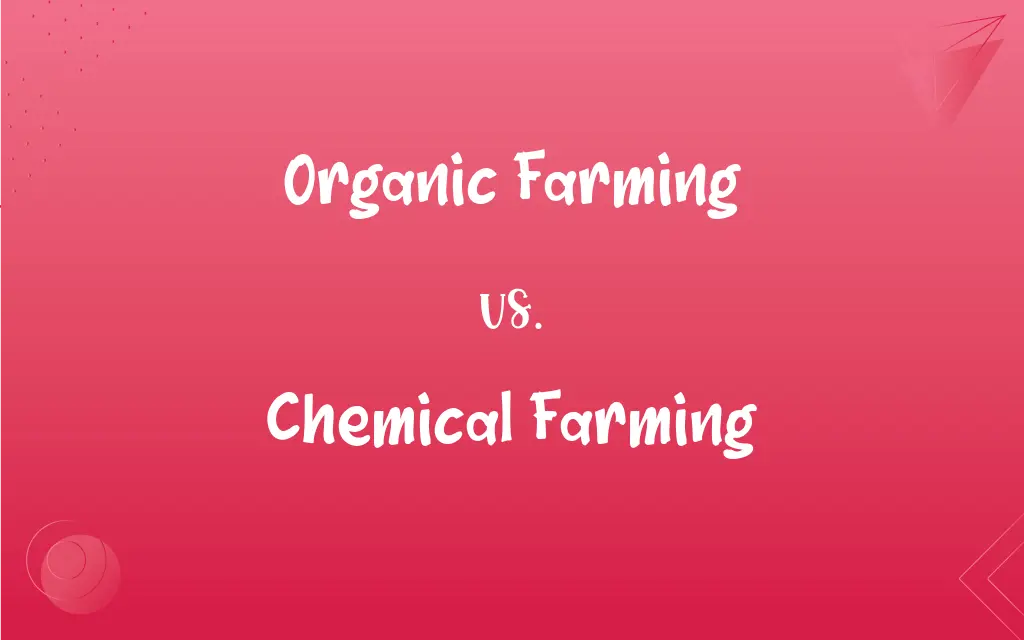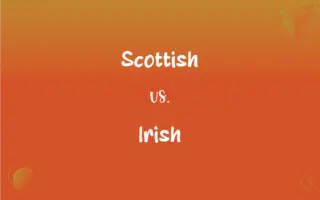Organic Farming vs. Chemical Farming: What's the Difference?
Edited by Janet White || By Harlon Moss || Updated on October 20, 2023
Organic farming prioritizes natural inputs and ecological balance; chemical farming relies on synthetic inputs for enhanced yields.

Key Differences
Organic farming is an agricultural system that employs natural inputs and promotes ecological balance. Chemical farming, on the other hand, relies heavily on synthetic inputs like fertilizers and pesticides to increase yield and control pests.
In organic farming, the emphasis is on maintaining soil health, reducing pollution, and preserving the environment. Chemical farming, while effective in producing high yields, often does so at the expense of the environment and long-term soil health.
Organic farming typically refrains from using genetically modified organisms (GMOs) and synthetic chemicals, choosing to use natural methods of pest control and fertilization. Chemical farming, conversely, frequently utilizes GMOs and a range of chemical products to optimize production.
Organic farming often aims to promote biodiversity, crop rotation, and composting, while chemical farming might lead to monoculture crops and dependency on chemical solutions.
Comparison Chart
Inputs
Uses natural inputs like compost and manure.
Relies on synthetic fertilizers and pesticides.
ADVERTISEMENT
Environmental Impact
Aims to reduce pollution and enhance biodiversity.
Can contribute to pollution and decrease biodiversity.
Yield
Might produce lower yields but of higher nutritional value.
Typically produces higher yields.
Soil Health
Focuses on long-term soil health and fertility.
Might deplete soil nutrients over time.
Pest Control
Uses natural methods like crop rotation and beneficial insects.
Often depends on chemical pesticides.
Organic Farming and Chemical Farming Definitions
Organic Farming
Organic farming is a holistic method that focuses on ecological balance.
Through organic farming, he hoped to restore the natural balance of his land.
ADVERTISEMENT
Chemical Farming
Chemical farming utilizes synthetic inputs to boost crop yields.
With the advent of chemical farming, his crop production doubled in the first year.
Organic Farming
Organic farming emphasizes natural processes and inputs for cultivation.
She transitioned her land to organic farming to avoid using synthetic chemicals.
Chemical Farming
Chemical farming often incorporates GMOs and chemical pesticides.
Chemical farming has enabled him to fight pests more effectively, but at an environmental cost.
Organic Farming
Organic farming aims to enhance soil health through natural means.
Thanks to organic farming, the soil on her farm has never been healthier.
Chemical Farming
Chemical farming seeks to maximize production using modern agricultural technologies.
Thanks to chemical farming, the country achieved food surplus within a decade.
Organic Farming
Organic farming refrains from using synthetic chemicals and GMOs.
He started organic farming to produce food without artificial additives.
Chemical Farming
Chemical farming can lead to soil nutrient depletion over time.
The drawback of prolonged chemical farming was evident in the deteriorating soil quality.
Organic Farming
Organic farming promotes a sustainable and environmentally-friendly approach to agriculture.
The shift to organic farming has increased biodiversity on the farm.
Chemical Farming
Chemical farming relies on a scientific approach, often prioritizing yield over sustainability.
She debated the pros and cons of chemical farming, considering its high-yield potential.
FAQs
Can organic farming produce high yields?
While typically lower than chemical farming, organic yields can be competitive with proper management.
What is organic farming?
Organic farming is an agricultural system that uses natural inputs and methods to promote ecological balance and soil health.
Is organic farming environmentally friendly?
Yes, organic farming aims to be sustainable and reduce pollution by avoiding synthetic chemicals.
How does chemical farming differ from organic farming?
Chemical farming relies on synthetic inputs like fertilizers and pesticides to increase yield, whereas organic farming uses natural methods.
Is chemical farming harmful to the environment?
Chemical farming can contribute to pollution and decrease biodiversity due to synthetic inputs.
What's the primary goal of organic farming?
Organic farming aims to produce food sustainably while maintaining ecological balance.
What drives the demand for organic farming products?
Health concerns, environmental awareness, and taste preferences often drive demand.
Are GMOs used in chemical farming?
Yes, chemical farming often incorporates GMOs for enhanced production.
How do organic farmers control pests without chemicals?
They use natural methods like beneficial insects, crop rotation, and barriers.
Is transitioning from chemical to organic farming easy?
It can be challenging due to changes in practices, but with time and knowledge, many farmers succeed.
Do organic farmers use any pesticides?
Organic farmers may use natural pesticides, but they avoid synthetic chemical pesticides.
How does chemical farming affect soil health?
Prolonged chemical farming can deplete soil nutrients and degrade soil health over time.
Do chemical farming practices impact water sources?
Chemical runoff from farms can pollute water sources, affecting aquatic life and human health.
Why is chemical farming popular?
Chemical farming often produces higher yields and can be more effective in pest control.
Are organic farming products more expensive?
Often, organic products are pricier due to higher production costs and perceived health benefits.
What are the environmental benefits of organic farming?
Reduced pollution, enhanced biodiversity, and improved soil health are key benefits.
Can chemical farming adapt to be more environmentally friendly?
With research and innovation, chemical farming can adopt practices that reduce its environmental footprint.
Is food from organic farming healthier?
Organic food avoids synthetic chemicals and GMOs, often making it a preferred choice for health-conscious individuals.
Can chemical farming be sustainable?
While it can achieve high yields, chemical farming's sustainability is often questioned due to its environmental impact.
Why do chemical farmers use synthetic pesticides?
To effectively combat pests and diseases, increasing yield and production.
About Author
Written by
Harlon MossHarlon is a seasoned quality moderator and accomplished content writer for Difference Wiki. An alumnus of the prestigious University of California, he earned his degree in Computer Science. Leveraging his academic background, Harlon brings a meticulous and informed perspective to his work, ensuring content accuracy and excellence.
Edited by
Janet WhiteJanet White has been an esteemed writer and blogger for Difference Wiki. Holding a Master's degree in Science and Medical Journalism from the prestigious Boston University, she has consistently demonstrated her expertise and passion for her field. When she's not immersed in her work, Janet relishes her time exercising, delving into a good book, and cherishing moments with friends and family.
































































